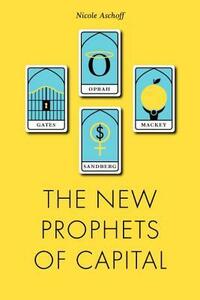Take a photo of a barcode or cover
Excellent, approachable examination of how efforts to reform or correct for the problems of capitalism often end up retrenching its worse tendencies. It's no surprise that LEAN IN or CONSCIOUS CAPITALISM can be found in airport bookstores everywhere, since they ultimately pose no threat to the established order: adding rich women to corporate boards doesn't mean policies will become any kinder to poor women, and nods in the direction of social responsibility don't break the cycle of consumption that drives environmental harm. Meanwhile, Gates pours his billions into social change by fiat (giving editorial columnists ever a case of the vapors) while Oprah follows Sandberg's lead by exhorting her followers to focus on self-betterment rather than agitating to change the existing order.
Aschoff critiques all four through a Marxist lens, which is to say one that points out the embedded capitalist ideology in each and how they perpetuate some of the capitalist processes that contribute to the problem in the first place. To crib from crushingbort's great tweet about libertarians, each thinks "the problems are very bad while the causes, the causes are very good". All that's missing is a look at respectability politics, perhaps excluded because it's waning while the others still seem to be waxing.
Highly recommended, and a quick read with excellent resources for diving further.
Aschoff critiques all four through a Marxist lens, which is to say one that points out the embedded capitalist ideology in each and how they perpetuate some of the capitalist processes that contribute to the problem in the first place. To crib from crushingbort's great tweet about libertarians, each thinks "the problems are very bad while the causes, the causes are very good". All that's missing is a look at respectability politics, perhaps excluded because it's waning while the others still seem to be waxing.
Highly recommended, and a quick read with excellent resources for diving further.
informative
A concise but clear explanation and exploration of sociological theories on feminism, neoliberalism, capitalism and free market that connects them to instances (or in this case personas) that embody these current social system supporting discourses in real life.
informative
fast-paced
توی دوره و زمانهی سرسامآور و پرسروصدای ما دربارهی سرمایهداری هم مثل تقریباً هر رطب و یابس دیگری حرف و نقد زیاد زده شده و دائماً میشود. نقدهایی که به ندرت جدی و قابل اعتنا هستند و این کتاب قطعاً از این دسته نیست.
ایدهی اصلی کتاب را میشود در یک صورتبندی ساده اینطور بیان کنیم: پیشنهادهای سرمایهدارانی مثل بیل گیتس و شریل سندبرگ برای حل معضلات سرمایهداری با در نظر نگرفتن واقعیتهای اساسی نظام اقتصادی و اجتماعی عملاً ابزار توسعهی بیشتر بحران هستند. و خب، راهحل؟ یک نسخهی دستمالی شده از سوسیالم دموکراسی که پیچیدگیهای اولیه وضعیت موجود را هم نمیتواند حلاجی کند و معلوم نیست به چه چیزی ما را دعوت میکند. پیشنهادی که انگار یک دانشجوی پرشور با کمتوجهی معمول آدمها در این سن و سال و فضا آن را طرح کرده است.
توجه داشته باشید که زمینهی کتاب جامعهشناختی و اقتصادیست و نه فلسفی و به همین دلیل توقع کاربرد و کارآمدی و پیشنهاد ازش میرود و اگرنه با متون فلسفی دربارهی سرمایهداری جور دیگری باید مواجه شویم.
ترجمه پر دستانداز و معمولیست و کم نیست فرازهایی که این بیرمقیش واقعاً حوصله را سر میبرد.
ایدهی اصلی کتاب را میشود در یک صورتبندی ساده اینطور بیان کنیم: پیشنهادهای سرمایهدارانی مثل بیل گیتس و شریل سندبرگ برای حل معضلات سرمایهداری با در نظر نگرفتن واقعیتهای اساسی نظام اقتصادی و اجتماعی عملاً ابزار توسعهی بیشتر بحران هستند. و خب، راهحل؟ یک نسخهی دستمالی شده از سوسیالم دموکراسی که پیچیدگیهای اولیه وضعیت موجود را هم نمیتواند حلاجی کند و معلوم نیست به چه چیزی ما را دعوت میکند. پیشنهادی که انگار یک دانشجوی پرشور با کمتوجهی معمول آدمها در این سن و سال و فضا آن را طرح کرده است.
توجه داشته باشید که زمینهی کتاب جامعهشناختی و اقتصادیست و نه فلسفی و به همین دلیل توقع کاربرد و کارآمدی و پیشنهاد ازش میرود و اگرنه با متون فلسفی دربارهی سرمایهداری جور دیگری باید مواجه شویم.
ترجمه پر دستانداز و معمولیست و کم نیست فرازهایی که این بیرمقیش واقعاً حوصله را سر میبرد.
informative
inspiring
fast-paced
informative
reflective
fast-paced
informative
fast-paced
A very accessible read that critically examines the ideas behind these famous elite storytellers. They are being recognized as saints, saviors of humanity, or "prophets" because we're being hegemonized by their noble intentions as the solution to many problems such as inequality, gender divide, environmental degradation, and poverty. When in fact, their market-based solutions reinvigorate an economic system that generates these problems in the first place.
Aschoff analyzes these new prophets respectively in four chapters. Sheryl Sandberg's feminist movement "on a systemic level it strengthens the forces that oppress and divide women"; John Mackey's Whole Foods conscious capitalism which its sustainability is still questionable; Oprah Winfrey's self-improvement story that overlooks structural inequality; and Melinda & Bill Gates' philanthrocapitalism which sets up free-market as a solution even though most people don't have the money to pay for what they need.
Another book with a similar issue is Winners Take All by Anand Giridharadas. I've yet to read it, but recently I watched him on Patriot Act with Hasan Minhaj and found his metaphor perfectly explains the situation: "Batman is what all these plutocrats do. You cause problems by day in the way you run your company. And then you put on a suit at night and pretend you are the solution. Let's tax the hell out of Bruce Wayne. Then we wouldn't necessarily need him to put on a costume. [H: Your take is anti-Batman?] I want to make Batman unnecessary."
Despite their good intentions, we need to question what repercussions these elite storytellers might actually bring in the future. As Aschoff concluded, "At the end of the day, for capitalism to function, most of us must believe in the system and voluntarily devote our energies to it." While this book doesn't dive much into a practical solution, it shows us how this "feel-good capitalism" helps to obliterate the public interest in alternative or adjustments to modern capitalism and touts what Bourdieu called economic fatalism. It's a refreshing read that we currently need, and it reminds us to keep an eye on more prophets to come. Now, let's watch a TED talk.
Aschoff analyzes these new prophets respectively in four chapters. Sheryl Sandberg's feminist movement "on a systemic level it strengthens the forces that oppress and divide women"; John Mackey's Whole Foods conscious capitalism which its sustainability is still questionable; Oprah Winfrey's self-improvement story that overlooks structural inequality; and Melinda & Bill Gates' philanthrocapitalism which sets up free-market as a solution even though most people don't have the money to pay for what they need.
Another book with a similar issue is Winners Take All by Anand Giridharadas. I've yet to read it, but recently I watched him on Patriot Act with Hasan Minhaj and found his metaphor perfectly explains the situation: "Batman is what all these plutocrats do. You cause problems by day in the way you run your company. And then you put on a suit at night and pretend you are the solution. Let's tax the hell out of Bruce Wayne. Then we wouldn't necessarily need him to put on a costume. [H: Your take is anti-Batman?] I want to make Batman unnecessary."
Despite their good intentions, we need to question what repercussions these elite storytellers might actually bring in the future. As Aschoff concluded, "At the end of the day, for capitalism to function, most of us must believe in the system and voluntarily devote our energies to it." While this book doesn't dive much into a practical solution, it shows us how this "feel-good capitalism" helps to obliterate the public interest in alternative or adjustments to modern capitalism and touts what Bourdieu called economic fatalism. It's a refreshing read that we currently need, and it reminds us to keep an eye on more prophets to come. Now, let's watch a TED talk.





